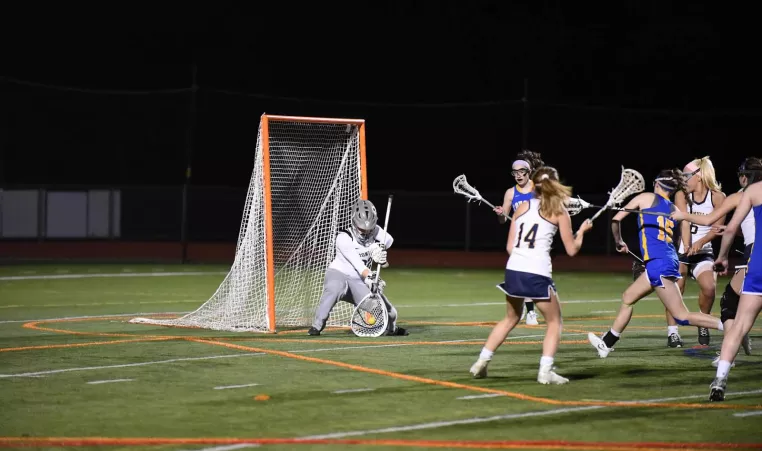Playing Multiple Sports The Key to Madison Doucette’s Hockey and Lacrosse Success

It wasn’t long after she first suited up on the ice at around four or five years old that Madison Doucette envisioned herself as a college hockey player.
“I always dreamed of playing college hockey,” said Doucette, a Kansas City native. “When I was growing up, all of my favorite athletes were female athletes and a lot of them played college hockey, so I looked up to them.”
At the time, Doucette also dabbled at midfield during lacrosse season, because everybody’s a midfielder when they start out. When her team needed a goalie one time, her coach put her in goal, where her athleticism naturally took over. Despite that, she never thought much of it, but when her family moved to the Unionville school district in eighth grade, she started to play a little more lacrosse.
In her freshman year, she went to a practice at Unionville and tried being a goalie again. That’s the last time she found herself without a permanent home in the crease.
“One of our coaches, Lisa Aikman, told me, ‘throw away your field stick,’” Doucette recalled.
Next fall, Doucette will head to Big 10 lacrosse power Northwestern as the Wildcats’ lone goalie in her class. It’s a surreal feeling for her, particularly when she only got serious about lacrosse when her family moved, but it’s also a testament to a decision that she made a long time ago.
There are countless studies warning against the perils of sport specialization, yet there’s never been more of it. Parents and athletes chase the glory of rarely-attainable scholarship money, and those that do get scholarship money might not even break even for what they paid for extra training, clinics, and trainers.
The YMCA of Greater Brandywine has showed a commitment to promoting playing multiple sports through its programs and facilities. Poke around, and you can find basketball leagues, swimming pools, dance and gymnastics classes, and so much more. Click here to see how you can get involved in much more than one sport.
Doucette is still a high-level hockey center, leading the Inter-County Scholastic Hockey League’s Girls Division in assists (25) and points (62) a season ago and added a ludicrous 10 points in two games as Unionville won the girls’ Flyers Cup. She was named the Daily Local’s Girls Player of the Year, too. While she decided to stop playing club hockey for the Jr. Flyers in West Chester this year, she’ll be back on the ice and she wouldn’t have it any other way.
“Breaking it up definitely helps,” Doucette said. “You get a little run down and a little fed up with certain situations, so you need a respite from the sport. When hockey ends, I’m so excited for lacrosse, and when lacrosse ends, it’s, like, ‘when can I get back on the ice?’”
Growing up, Doucette ran track and cross-country and also played soccer, softball and volleyball. Even to this day, she said that playing center in hockey helps her increase her reaction speed on the lacrosse field, as well as better identifying shooters’ angles. Conversely, being a goalie helps her locate the puck on the ice and better focus on the little things going around her.
“I would advise against sport specialization,” Doucette said. “Playing multiple sports is so much better for your athleticism because you move in different ways and it’s better for your recovery., Mixing it up is good for your body.”
That’s advice that’s backed by studies, as well as most high-level athletes’ personal experience.
"I was just at an Aspen Institute Project Play Summit, where athletes from a variety of different sports, indicated that playing different sports was a key component in their success later on,” YMCA Association Sports Director Patrick Dugan said. “They also indicated that it made them better athletes overall, and that it gave them a mental break from the focus and pressure associated with their preferred sport.
“Most college and professional coaches will tell you they are looking for multi-sport athletes, yet specialization toward playing in one sport is becoming the norm,” Dugan added. “I'm not sure that the days of the multi-sport athlete aren't numbered, which is unfortunate and counterintuitive toward developing better athletes."
Of course, it’s easy for Doucette to prefer what she’s used to, particularly since she’s one of the few who will play at college sports’ highest level. Unsurprisingly, though, there’s plenty of support from her future coaches and others who recruited her. Most, if not all, college coaches will also tell you that multi-sport athletes come in with more potential because they haven’t yet committed to one sport year-round.
“(Northwestern assistant coach) Tim McCormack loves it,” Doucette said. “He always asks me how it’s going and he thinks it’s one of the differences between me and other girls. I was also getting recruited by UConn for both sports and I went there for a hockey camp. (Huskies coach) Katie Woods came to watch me play, too. Coaches were great about playing multiple sports, especially since I didn’t want to specialize and I didn’t want to have to make up my mind.”
Why would anyone want to specialize if they didn’t have to?